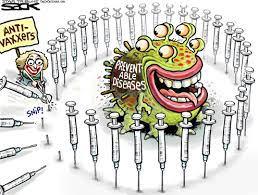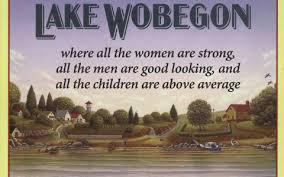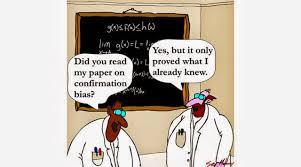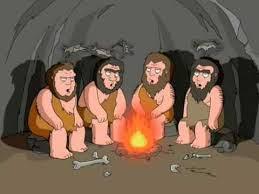 Our pockets hold a device to access all the information in the world. We use it to view cat videos. And while the sum of human knowledge grows hyperbolically, and we’re getting more education than ever, the average American’s ignorance is rising.
Our pockets hold a device to access all the information in the world. We use it to view cat videos. And while the sum of human knowledge grows hyperbolically, and we’re getting more education than ever, the average American’s ignorance is rising.
This is the nub of Tom Nichols’s 2017 book, The Death of Expertise. (Nichols is a professor and foreign affairs wonk.) Expertise itself isn’t dying — it’s being rejected.
Take vaccination. Expert, knowledgeable, responsible opinion is clear about its benefits, and the baselessness of fears about it. They began with a fraudulent “study” by a British doctor, Andrew Wakefield, that was authoritatively debunked. Wakefield’s medical license was even revoked. That hasn’t stopped the nonsense, still spewed by irresponsible people like former Playboy pin-up Jenny McCarthy.

Civilization is grounded upon division of labor and specialization of function. We have doctors who doctor and plumbers who plumb, with arcane expertise not possessed by the mass of others. This is how airplanes are engineered and flown. We trust such experts to do these things.

“A little knowledge is a dangerous thing.” That old saw is weaponized by the internet, spreading what might appear to be “knowledge” but actually isn’t. While previously, discourse about matters like science or public policy was largely confined within intellectual ghettoes, those walls have been blown down.
Anti-intellectualism and magical thinking have long afflicted American culture. Worse now, many people, fortified by a college degree, deem themselves their own intellectual experts.

Schools find themselves forced to surrender to this ethos, with fluff courses, “safe spaces” against intellectual challenge, feelings allowed to trump facts, and gradeflation to flatter fragile egos. “When college is a business, you can’t flunk the customers,” Nichols says. Critical thinking? Rational discourse? Forget it.
The more I learn, the more I realize how little I know. Thusly stepping back to see oneself objectively is metacognition. Such humility is fading from America’s narcissistic culture, where college makes people imagine they’re smart without giving them the tools to recognize their own deficiencies (or deficiencies in the “information” they imbibe). Anti-vaccine madness is more rampant among the college-educated than the uneducated.

It’s an irony that in the past, with far fewer people “educated,” there was more respect for education, expertise, seriousness, and indeed facts. A less educated past America would never have tolerated the lies and vulgarities of a Trump.
But there’s also the cynical feeling that experts and elites have their own self-serving agendas and have led us astray. Look at the Vietnam War; the 2008 financial crisis. Nichols addresses at length the problem of expert error. But he invokes the old conundrum of a plane crash getting headlines while thousands of daily safe flights are just taken for granted. In fact, everything about modernity and its benefits — medical science, air travel, and so much else — is the work of experts. If they weren’t generally very good at it, planes wouldn’t fly. You would not board one staffed by a bunch of Joe Sixpacks. Experts can be wrong, but is it likelier that Jenny McCarthy is right about vaccines?
“Rocket science” is used as a metaphor for extreme expertise. I recently saw a TV documentary about the Hubble Space Telescope* — which, after launch, didn’t work, a huge bungle by experts. But even more striking was how, against all odds, NASA people managed to figure out, and execute, a fix. Expertise more than redeemed itself.
Another factor in the shunning of expertise is a rising ethos of individualism and egalitarianism. It’s the idea that you — and your opinions (however derived) — are as good as anyone else and their opinions (expertise be damned). Nichols thinks Americans misunderstand democracy, confusing the concept of equality of rights with actual equality, and equal validity of all opinions. Yet at the same time there’s a refusal to engage in a serious way with the public sphere — “a collapse of functional citizenship.” Democracy is corrupted if voting isn’t based on a grasp of facts that are actually facts.

Declining trust in experts is part of a larger trend of declining social trust generally. Polls show a belief that other people are getting less trustworthy (for which there’s no evidence). Mainstream news has been a victim of this. Many Americans don’t know who to believe. Or, worse, their cynical lapse of confidence, in conventional repositories of trust, paradoxically leads them to swallow what should be trusted least. Like all that garbage from the internet — and the White House.
So rejecting input from real experts opens a field day for phony ones. The Jenny McCarthys, conspiracy freaks like Alex Jones, not to mention legions of religious and spiritualist frauds. Nichols cites Sturgeon’s law (Theodore Sturgeon was a sci-fi writer): 90% of everything is crap.
The ironies multiply. Trump’s election, and the Brexit vote too, were revolts against experts and elites, seen as lording over common folk. Yet those voters have delivered themselves, gift-wrapped, to the not-so-tender mercies of a different gang that exploits their ignorance and credulity for its own bad ends.
Americans are losing their grasp of the nation’s founding ideals and values (no longer taught in schools). Without such understanding, those principles cannot be sustained. Nichols sees a “toxic confluence of arrogance, narcissism, and cynicism that Americans now wear like [a] full suit of armor against . . . experts and professionals.” This, he says, puts democracy in a “death spiral” as disregard for informed expert viewpoints (and, one might add, just plain reality) produces ever worse results in the public sphere. This embitters citizens even more.
I’ve always seen a dichotomy between the smartest people, who really understand and know things, and the rest of humanity.

* A picture in that documentary included someone who was at my last birthday party!
Advertisements &b; &b;